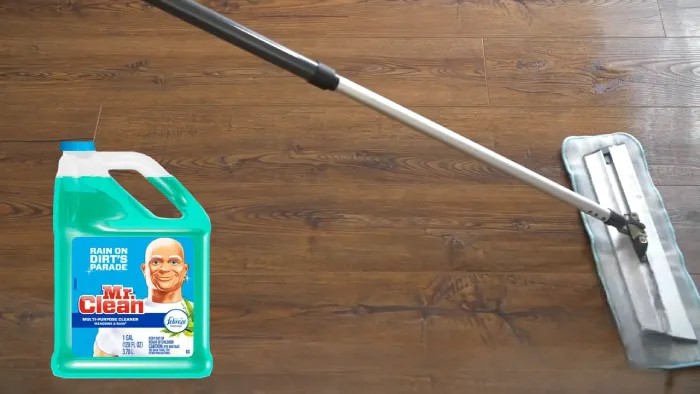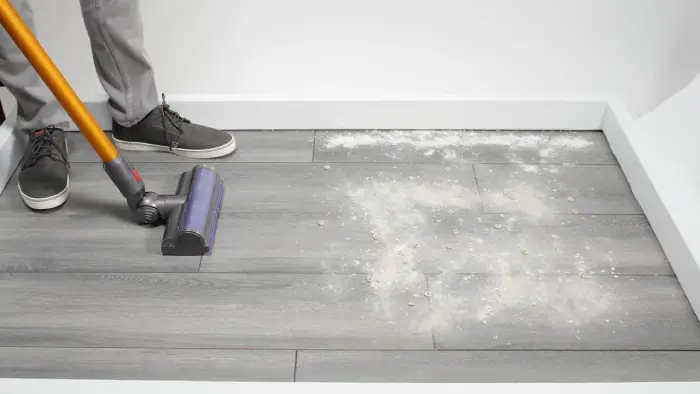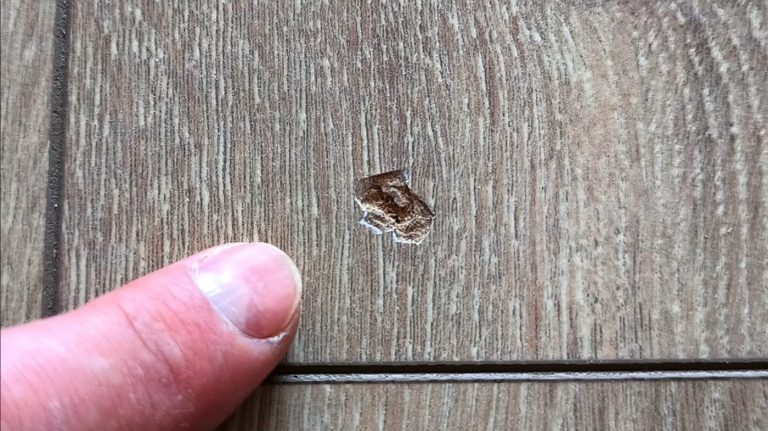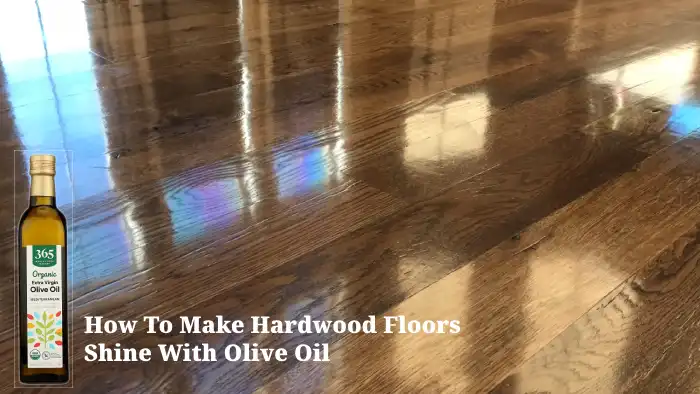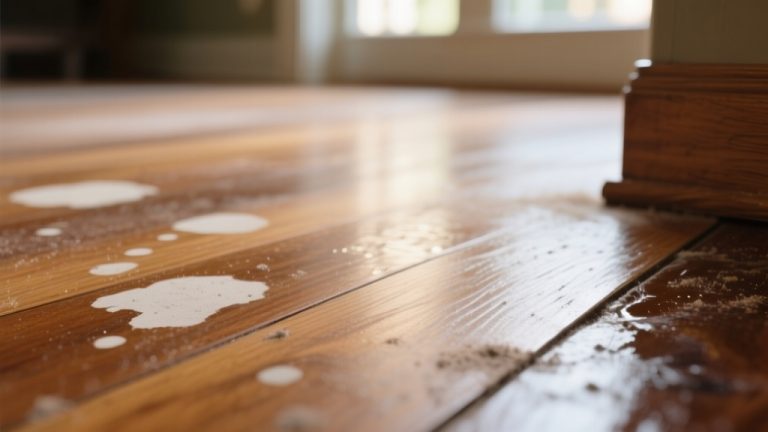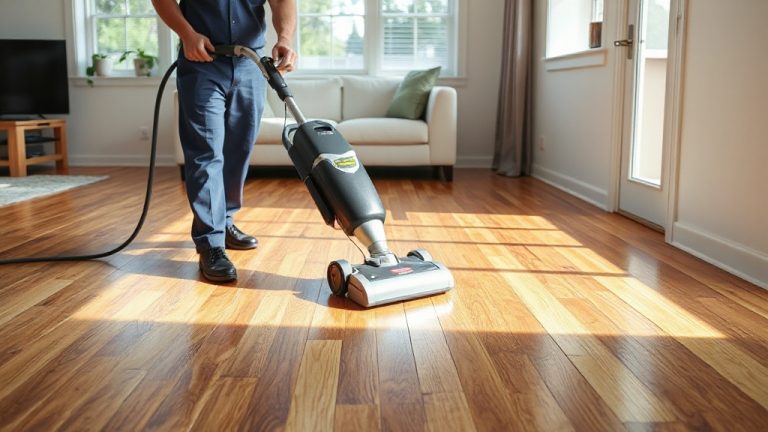Can You Use Mr Clean On Hardwood Floors: Unleash the Hidden Power
Hardwood floors are a timeless addition to any space, but maintaining their beauty can be challenging. Mr. Clean can help you with scuffs, scratches, and dirt to detract from your hardwood floors.
Mr. Clean is versatile and effective on many kinds of surfaces, including delicate ones such as hardwood floors. It’s tough on dirt and grime but gentle enough to avoid causing any damage to your floors.
Let’s discover the Power of Mr. Clean for Shiny Hardwood Floors. Learn all the essentials you need to achieve the best appearance of your hardwood floors.
Can You Use Mr Clean On Hardwood Floors? Here’s How with Its Ingredients
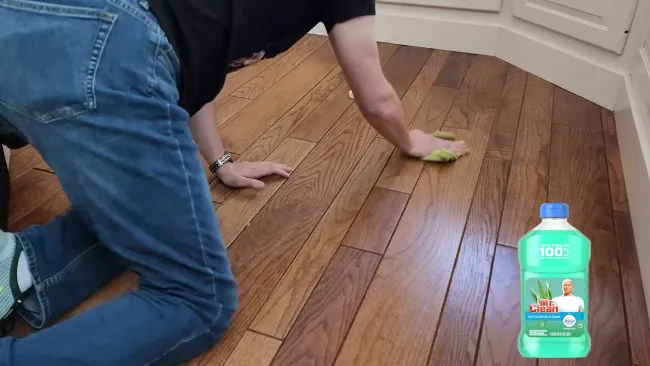
Mr. Clean is a brand of household cleaning products that includes various cleaners, sprays, and wipes for different surfaces. The primary function of Mr. Clean products is to remove dirt, grime, and stains from surfaces such as hardwood floors, walls, counters, and appliances.
This cleaning product uses a combination of surfactants, solvents, and chelating agents to break down the dirt particles and lift them away from the surface.
One key feature of Mr. Clean products is their ability to work on multiple surfaces without causing damage or leaving residues. For example, some Mr. Clean products are formulated specifically for hardwood floors and can safely clean them without dulling the finish or causing warping or discoloration over time.
Other Mr. Clean products may also suit tile floors, granite countertops, stainless steel appliances, and other common household surfaces.
Overall, Mr. Clean is an effective cleaning solution for many types of surfaces in a home or office environment. To avoid damage, read the instructions carefully before using any product on a new surface or material.
Key Ingredients In Mr. Clean:
Mr. Clean primarily comprises a surfactant called sodium lauryl sulfate (SLS). This substance helps to break down dirt and oil on surfaces by reducing their surface tension, allowing water to penetrate and wash them away. The foaming agent and emulsifier SLS are used in a lot of cleaning products.
Another important component of Mr. Clean is fragrance. While not essential for cleaning purposes, fragrances are often added to cleaning products to leave behind a pleasant scent after use. Mr. Clean usually has lemon or other citrus fruit notes with floral or herbal undertones depending on the product line.
It also contains various preservatives and stabilizers that help extend the product’s shelf life and ensure consistency from batch to batch. These may include substances like methylisothiazolinone and benzisothiazolinone, which work together to prevent bacterial growth and maintain pH balance.
Does Mr. Clean Pose Any Risks When Used On Hardwood Floors?
So you want to use Mr. Clean on your hardwood floors? No problem, but listen up. Things could get messy if you don’t use it right or leave it on for too long. Here’s what to watch out for:
- The use of Mr. Clean on hardwood floors may cause the surface to dull due to the cleaning solution’s chemical ingredients.
- Damage to the hardwood floors can occur when Mr. Clean is used too frequently or excessively.
- Surface abrasion of the hardwood floor can also occur due to the abrasive ingredients in the cleaning solution.
- Also, water damage can occur if Mr. Clean is used to clean hardwood floors that are not sealed or waxed.
What Are the Signs Of Damage to Look Out for on Hardwood Floors after Cleaning?
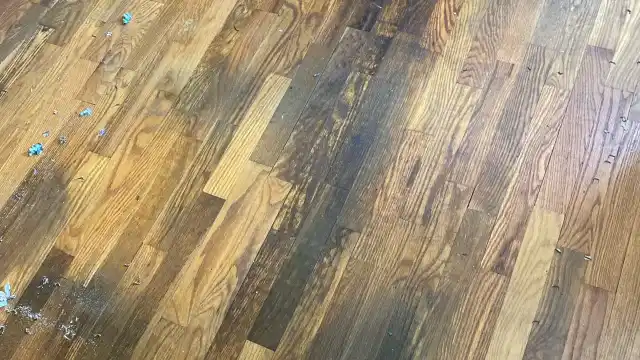
Keeping your hardwood floors in top condition requires preventive measures. Nonetheless, even with proper care and maintenance, damages can occur gradually. That said, homeowners need to learn how to spot early signs of damage to prevent further complications.
Scratches or Dents:
One common sign of damage on hardwood floors is scratches or dents. These can be caused by various factors such as high heels, furniture being dragged across the floor, or pets’ nails. The smallest scratches may not seem like a big deal at first, but if left untreated, they can accumulate and eventually ruin the wood surface.
Discoloration or Fading:
Another sign of damage to look out for is discoloration or fading. This can happen when hardwood floors are exposed to direct sunlight for extended periods without adequate protection from UV rays. Additionally, spills and stains not cleaned up promptly can lead to discoloration and fading over time.
Warping or Buckling:
Also, the warping or buckling of hardwood floors should be addressed immediately. This could indicate water damage or other structural issues within the home. In areas prone to moisture, like bathrooms and kitchens, homeowners should inspect hardwood floors regularly for warping or buckling.
How to Analyze the Results After Cleaning With Mr Clean On Hardwood Floors?
After applying cleaning products properly, it’s important to analyze the results. This will help you determine whether the cleaner effectively removed dirt and stains from your floors or if there are areas that require more attention.
To begin with, evaluate how well the product performed in removing specific types of stains such as oil, grease, or pet urine. If necessary, reapply the cleaner to stubborn spots before scrubbing them off gently using a soft-bristled brush.
Assess the overall appearance of your floors after cleaning by checking for any discoloration or damage caused by harsh chemicals in the product. If you notice any issues, consider switching to a different type of cleaner or diluting it with water to reduce its potency.
Observe how long the clean effects last on your floors. A good cleaning product should maintain its effectiveness for several days without requiring frequent application. However, it may be time to switch cleaners altogether if you constantly need to clean your floors due to quick wear and tear.
Is There An Alternative Cleaning Solution to Mr. Clean For Hardwood Floors?
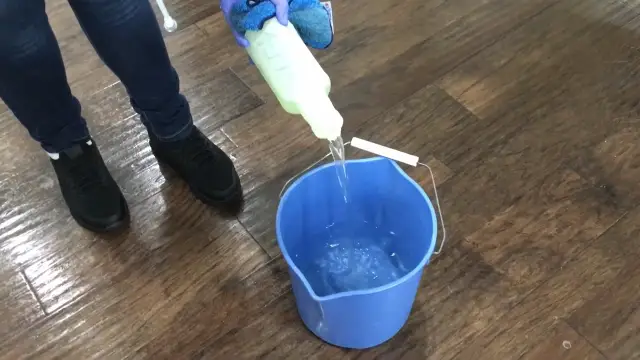
If you’re looking for a safer option than Mr. Clean for your hardwood floors, we’ve got some alternatives for you to check out. Here are some options to consider:
Many homeowners prefer natural cleaners over chemical ones due to their non-toxic properties and environmental friendliness. In order to maintain the shine of hardwood floors, natural cleaning ingredients can be used without causing damage to the floor or leaving residue behind.
One popular option for a natural cleaner is vinegar, which is effective at removing dirt and grime while also being safe for use on wood.
Another alternative cleaning product that works well on hardwood floors is baking soda. This versatile substance can clean stains and remove odors from your flooring.
Simply mix a small amount of baking soda with warm water to create a paste, then apply it directly onto the soiled area with a cloth or sponge. After letting the mixture sit for a few minutes, wipe away any excess with a damp cloth.
Vinegar
- Removes grime buildup
- Safe on wood surfaces
Baking Soda
- * Cleans & deodorizes
- * Can be used alone or in combination with other ingredients
Dos And Don’ts Of Cleaning Hardwood Floors
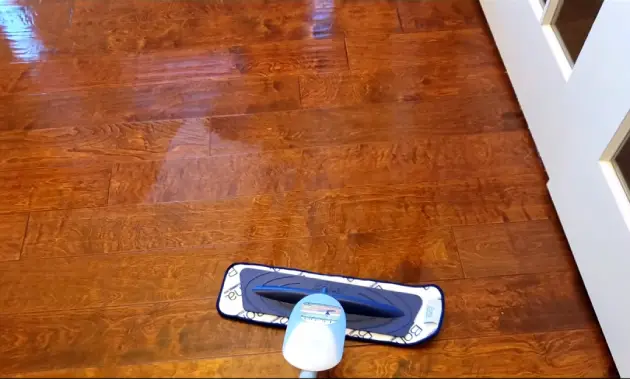
Cleaning hardwood floors can be a huge pain if you don’t know what you’re doing. Avoid any mishaps by keeping these dos and don’ts in mind.
#1. Mopping
Mopping is an essential part of cleaning hardwood floors. This process involves using a damp mop to clean the surface, effectively removing dirt and grime.
However, certain dos and don’ts need to be followed when mopping hardwood floors to avoid damage.
At first, it is important not to use too much water while mopping as excess moisture can seep into the wood’s grains, resulting in warping or swelling of the floorboards. Instead, opt for a slightly damp mop that will only leave behind minimal moisture on the surface.
Additionally, avoid using harsh chemicals such as bleach or ammonia-based cleaners that can strip off the protective layer on your hardwood floors.
Choose a gentle hardwood floor cleaner, like Mr. Clean Multi-Surface Cleaner with Gain Scent®️ . This product offers superior cleaning power without leaving any residue or streaks behind.
When using this solution, dilute it according to instructions and apply sparingly onto the mophead before starting the mopping process.
#2. Vacuuming
Mopping hardwood floors is one of the most important aspects of cleaning, but vacuuming is equally important. While many people think that sweeping is enough to keep their hardwood floors clean, a good quality vacuum cleaner can make all the difference in removing dirt, dust, and other debris from hard-to-reach areas.
For hardwood floors, there are some rules you should follow when vacuuming.
First of all, always use a brush attachment so your surface doesn’t get scratched. Additionally, adjust the suction level to low or medium settings to avoid pulling up any loose boards or causing damage to the finish.
It is also important to note that not all vacuums are created equal when it comes to hardwood floor cleaning.
Look for models with features such as rubber wheels and soft bristles designed specifically for these types of surfaces.
#3. Sweeping
Another essential aspect of cleaning hardwood floors is sweeping. Sweeping should be done frequently to remove loose dirt, dust, and debris that can scratch the surface of the flooring. It is a simple yet effective way to maintain your hardwood floors’ appearance.
Sweeping hardwood floors have some dos and don’ts also. For starters, use a soft-bristled broom or microfiber mop as this will prevent scratches on the surface. Avoid using stiff bristles or hard materials such as metal brushes that can damage the finish and leave marks on the wood.
Additionally, always sweep with the grain of the wood instead of against it. This ensures any debris picked up by the broom does not get pushed into small crevices between boards where they can cause damage over time.
Also, avoid using too much pressure when sweeping to prevent any scratching or scuffing on your floor’s surface.
Does mr. clean leave a residue on hardwood floors?
Mr. Clean Professional No-Rinse Floor Cleaner is designed to leave hardwood floors free from dulling or sticky residue. The product has been formulated to remove tough dirt from finished floor surfaces without leaving behind any undesirable buildup.
This eliminates the need for rinsing the surface after cleaning, as the cleaner will not leave any visible film or residue on the floor. Because of this, Mr. Clean No-Rinse floor cleaners can be considered a reliable choice for maintaining the shine and preserving the quality of hardwood floors.
Can mr. clean remove the urine smell from hardwood floors?
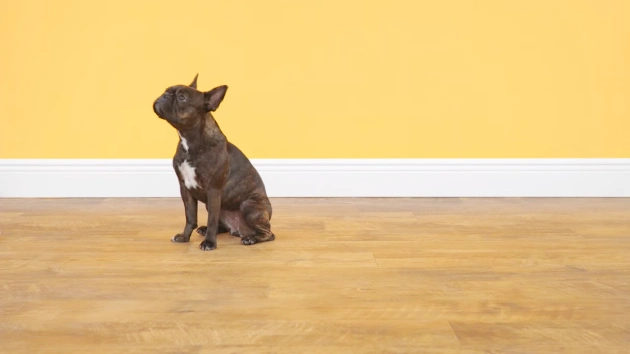
The urine smell from hardwood floors can be effectively removed by using Mr. Clean. With its powerful formula, Mr. Clean can demolish urine odors and various other foul smells such as feces, vomit, cat spray, organic decay, mold, mildew, and others.
Unlike other cleaning products that might leave soil attracting residue, Mr. Clean leaves zero residues, as mentioned above, ensuring a thoroughly clean and odor-free surface. Its advanced technology ensures that it penetrates deep into the hardwood floor, leaving no traces of the smell behind.
Therefore, given its proven effectiveness and lack of residue, Mr. Clean can be considered one of the best options for removing tough odors from hardwood floors.
Effortlessly Clean Hardwood Floors By Using Mr. Clean
Keeping hardwood floors clean can be tricky, but it can be made effortless with the right tools and knowledge. Mr. Clean is a popular choice for hardwood floors, but it’s important to use it cautiously and follow the manufacturer’s instructions. As mentioned earlier, using too much or too often will damage your wood.
Before you get down on your knees to scrub your hardwood floors, take a moment to make sure you won’t inadvertently damage your investment. Check your floor’s warranty and condition, then choose the right cleaner.
Alternatively, try a mixture of vinegar and water or invest in a specialized hardwood floor cleaner for a gentle yet effective alternative to harsh chemicals.
And if you want to use Mr. Clean, follow the correct instructions carefully for safe and suitable cleaning.

